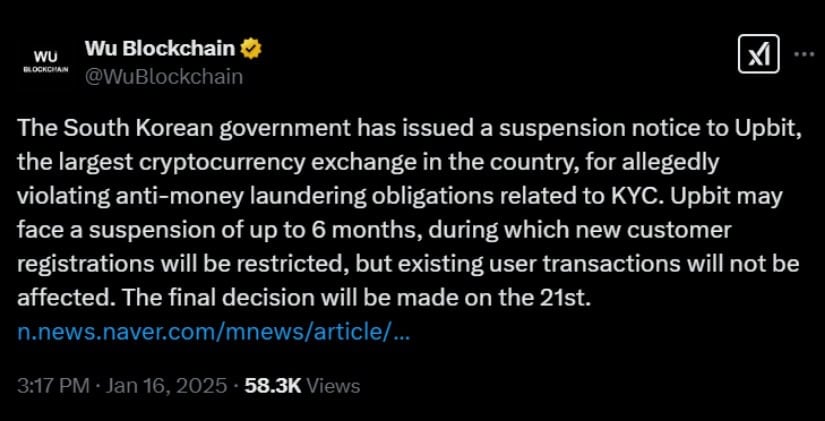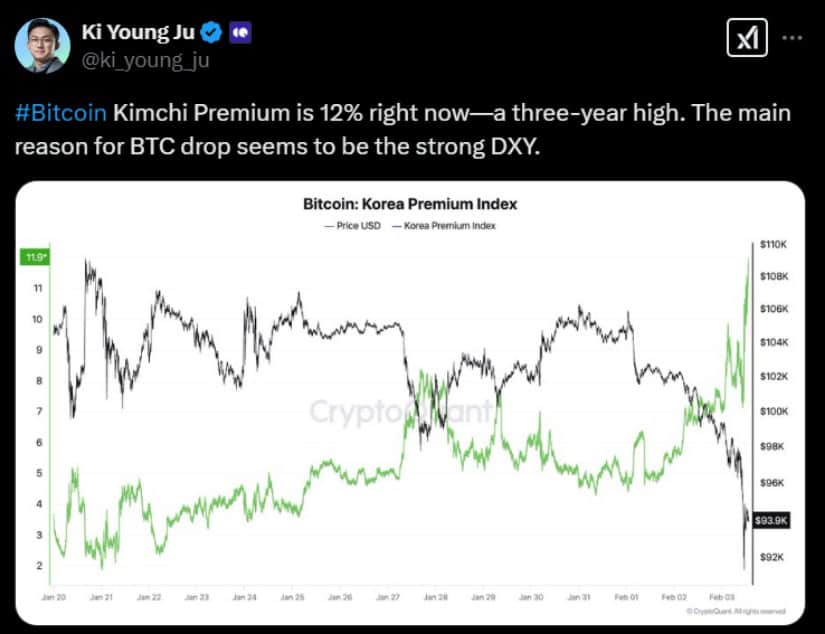
Government data now confirms that the number of registered virtual asset service providers in the country has dropped by over 26% within a year.
According to a February 7 report from the Financial Intelligence Unit (FIU), only 31 crypto exchanges remain active in South Korea, down from 42 in the previous year. Many of the firms that exited the market, such as GDAC, ProBit, Huobi Korea, and Bitrade, primarily operated as token-only platforms that lacked fiat trading support, making it difficult to sustain operations.
A key reason behind these closures is the failure to renew registrations, which resulted in the removal of several exchanges from the country’s official registry. Apart from these restrictions, South Korea’s martial law in early December 2024 also caused a significant Korean crypto market decline.
Token-Only Exchanges in Deep Trouble
Token-only exchanges have been in a vulnerable position for a while, primarily due to their lack of real-name bank accounts. Without fiat trading options like the Korean won or the U.S. dollar, user interest in these platforms remained low. The FIU report states, “Over 90% of these exchanges were in a state of complete capital erosion last year.” This led to the eventual shutdown of platforms such as Qubit and Coinbit, among others.
As the market continues to contract, the FIU warns that more exchanges could soon follow. Some firms still registered in South Korea have already expressed intentions to exit the market, while others are looking toward overseas expansion to escape domestic regulatory uncertainty.
South Korea’s regulatory environment has made it difficult for crypto businesses to operate smoothly. The nation’s strict anti-money laundering (AML) policies and Know Your Customer (KYC) requirements have placed an additional burden on exchanges, especially those lacking direct banking support.
Upbit Faces Potential Sanctions
One of South Korea’s largest exchanges, Upbit, is now under scrutiny and could face sanctions for allegedly failing to comply with the country’s AML and KYC regulations. Local news outlet Maeil reported that the Financial Information Analysis Institute (FIU), under the Financial Services Commission, has already notified Upbit of the pending penalties.

If the sanctions are confirmed, Upbit could be prohibited from onboarding new customers for up to six months. Such restrictions would pose significant challenges for the platform, which has remained one of the few dominant players in South Korea’s shrinking crypto market.
Upbit informed users that the decision would limit new customers from moving virtual assets off the exchange for a specific duration.
South Korea’s Kimchi Premium Hits 3-Year High
Even as local exchanges struggle, South Korea’s Bitcoin kimchi premium has surged, hitting a 10-month high. According to a recent post by CryptoQuant CEO Ki Young, the premium reached 12% on Monday, marking a three-year high. At the time of writing, it has settled at 8.20%.

South Korean Kimchi Premium Index hits 3 years high | Source: Ki Young
Kimchi premium refers to the price difference when Bitcoin trades higher on South Korean exchanges compared to other global platforms. This gap arises because foreign investors cannot access South Korea’s crypto market, and local investors who attempt arbitrage could face penalties under capital control laws.
The premium is often a sign of strong local demand for crypto despite market downturns. However, it also underscores the regulatory walls that prevent the free movement of digital assets, limiting opportunities for traders.






